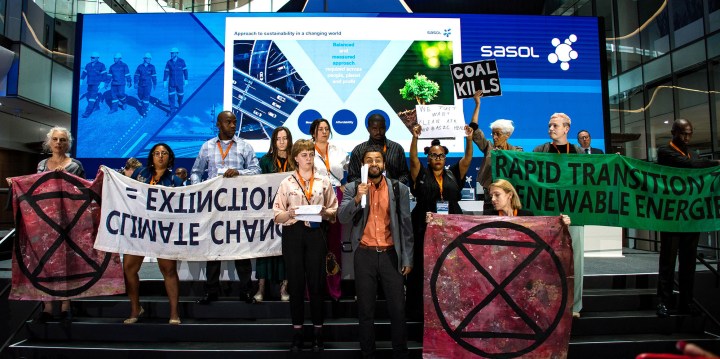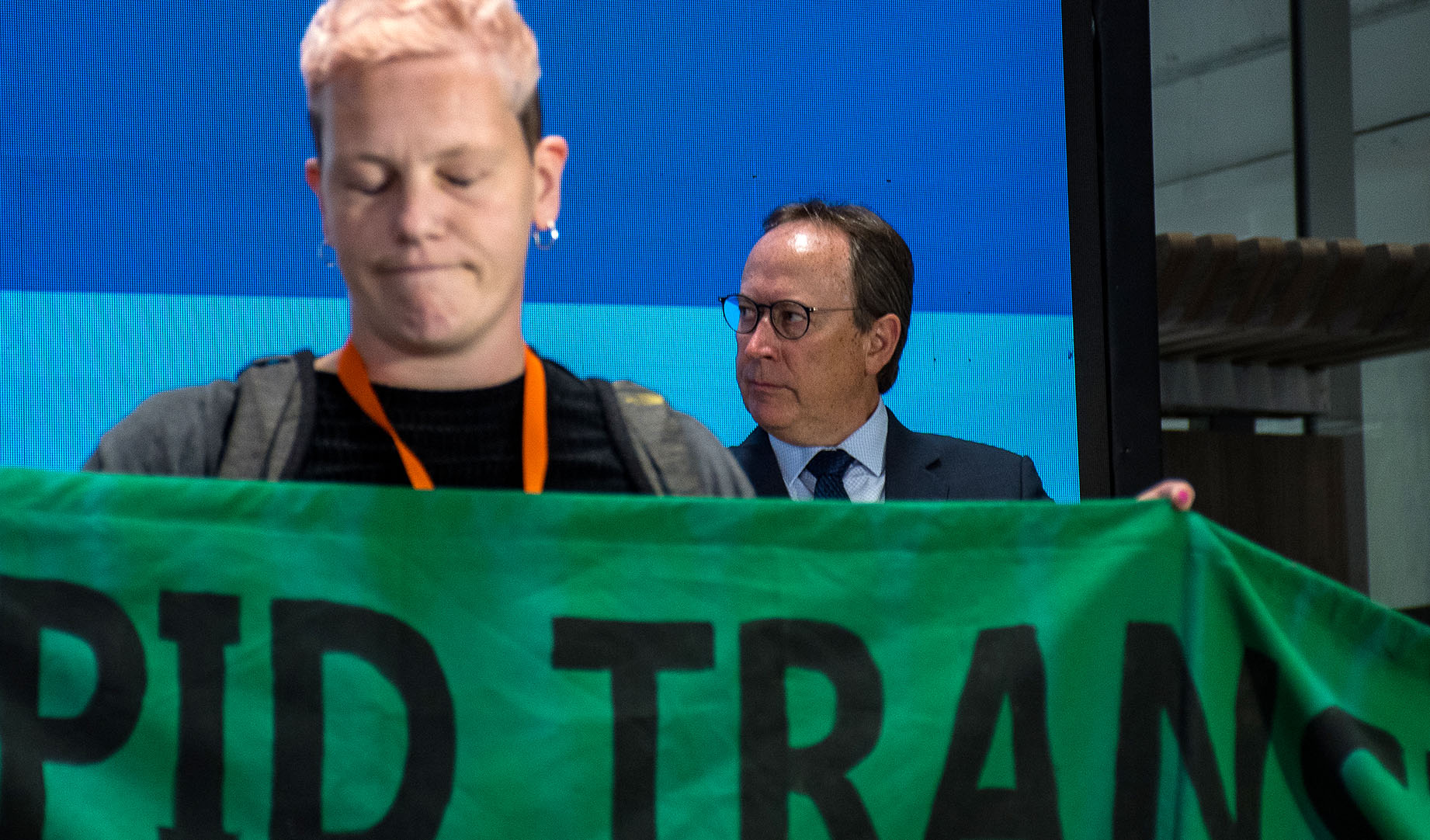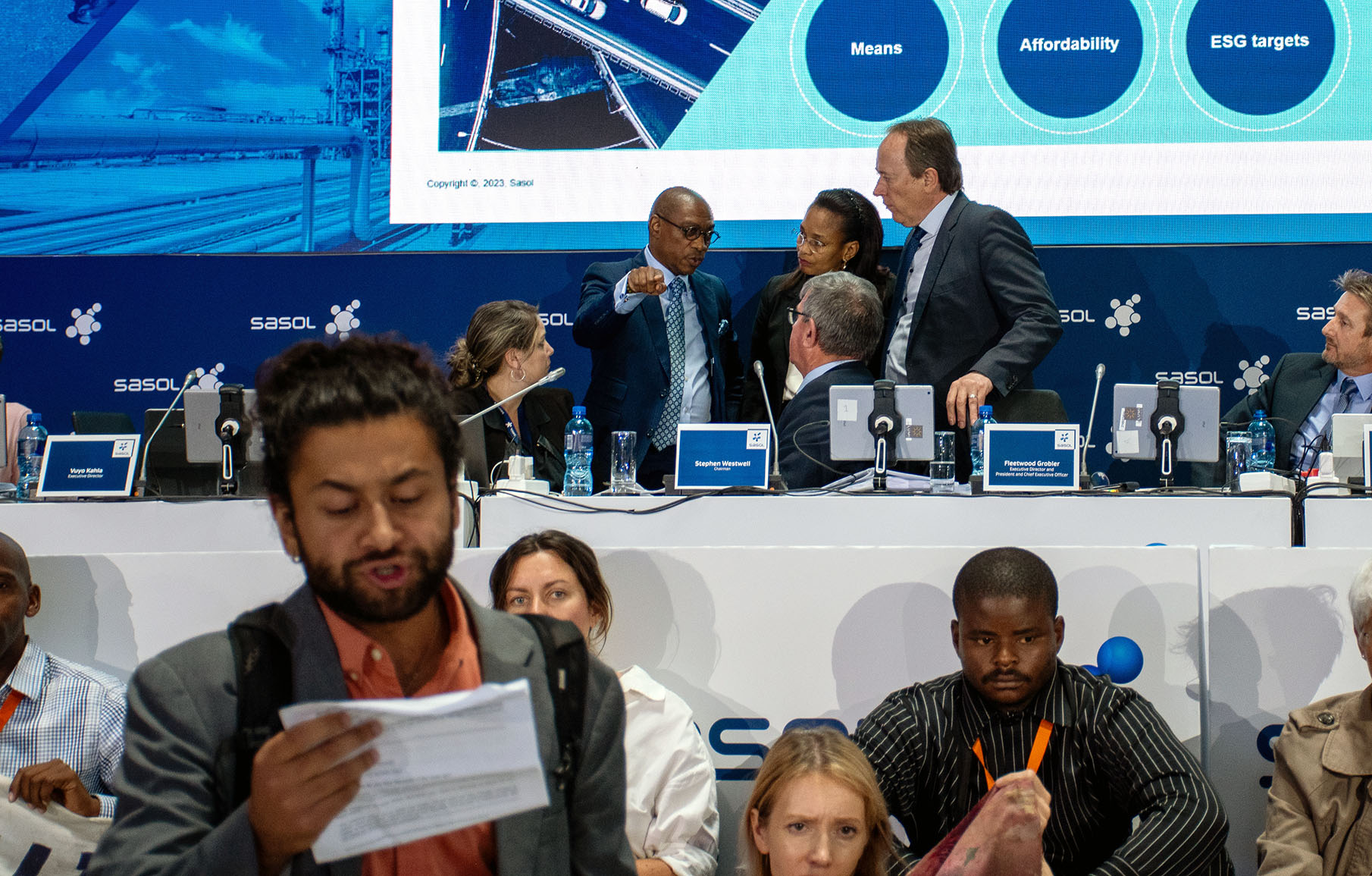DISCONTENT VOICED
Sasol AGM cancelled after climate activists protest

It was expected that Sasol’s Climate Change Report would be voted against by key stakeholders – Old Mutual Investment Group and Ninety One – at the entity’s Annual General Meeting on Friday 17 November. But before voting could actually happen, climate activists took to the stage to highlight environmental and social consequences of the energy giant’s plants.
One week before the AGM, asset managers Old Mutual Investment Group (OMIG) and Ninety One announced they would vote against the non-binding resolution on Sasol’s decarbonisation commitments.
Sasol’s decarbonisation plan, which they presented in their annual climate change report, includes targets to reduce its greenhouse gas (GHG) emissions by 30% by 2030 – reached through the decommissioning of boilers, the increased use of renewable energy by 50%, and the introduction of liquified natural gas to reduce Sasol’s reliance on coal.
“It strikes us that this year’s non-binding advisory resolution on climate change makes no reference to targets (as was the case in previous years), and as such, doesn’t sufficiently afford shareholders the opportunity to voice discontent with progress on climate change strategy implementation, which is the fundamental right of shareholders in having this item on the AGM agenda in the first place,” said Nicole Martens, Head of Stewardship for Old Mutual Investment Group in a letter to investors.
“This approach is in direct contradiction to our repeated requests to the company to provide more information on tangible short- and medium-term targets, alongside detailed action plans and accountability mechanisms,” the letter continues.
Martens said Old Mutual has been actively engaging with Sasol on its approach to the climate emergency for a number of years, including through a shareholder resolution in 2019 calling for the strengthening of the company’s climate plan, as outlined in their Listed Equity Stewardship Guidelines 2022, but said progress with their climate targets “appears to be regressing”.
“It is our view that Sasol’s insufficiently ambitious action on climate is putting the country’s ability to transition at risk,” Martens said.
The group took the decision to vote against several resolutions, including against approving Sasol’s Climate Change report.

Sasol CEO and President Fleetwood Grobler during a disruption to the company’s 2023 AGM, when climate activists took to the stage, Sasol Headquarters, Sandton. (Photo: Julia Evans)
Asset manager Ninety One also decided to vote against the report, saying that “whilst climate disclosure is good and we are broadly comfortable with the science-based methodology behind the 30% CO2e reduction target for 2030, which Sasol have indicated they remain committed to, there is still too much uncertainty and lack of momentum around the implementation of the strategy, particularly the uncertainty around gas supply and a clear alternative”.
Old Mutual and Ninety One are some of Sasol’s biggest investors, with Ninety One having $490-million invested in bonds ($28-million) and shares.
Non-profit had similar concerns
Non-profit shareholder activism organisation Just Share raised similar concerns about Sasol’s Climate Change report – in 2021 the organisation advised that there was a concerning lack of detail about several crucial elements of Sasol’s ambitions and actions, which made it extremely difficult to assess its feasibility and credibility.
Tracey Davies, executive director of Just Share, which advocates for corporate South Africa to use its financial and social power to drive urgent action to combat climate change, told Daily Maverick that after reading the message from CEO Fleetwood Grobler in the report, it was clear that Sasol is expressing doubts about its ability to meet those targets.
Grobler said “we remain as energised about decarbonising as we have been at any stage in the recent past” but Davies pointed out that being “energised” about decarbonising is not the same as decarbonising.
Davies said “the background to all of this is that their emissions increased this year, and they say emissions will increase again next year. Remember, we’ve got seven years until 2030 and a 30% reduction in emissions is a gigantic project for Sasol”.
Davies pointed out that Grobler appears to be preparing shareholders for Sasol to not meet its targets by speaking about shifting geopolitical interests, saying “the decarbonisation commitment of other energy majors has become somewhat clouded by the energy security imperative” and that “factors over which we have minimal or no control threaten to hinder the delivery we are aiming to achieve by 2030”.
In his report, Grobler said “multiple variables impact the affordability of our roadmap, which to be achievable, has to be affordable”.
Should alarm shareholders
“This admission should be very alarming to shareholders,” said Davies, “because if Sasol says that its decarbonisation roadmap is unaffordable, then it is essentially admitting that it is a stranded asset.”
Davies added that “the overall tension, which is, of course, replicated across the planet – is between short-term profits, and long-term sustainability,” explaining that investing in a just energy transition would impact short-term profitability.

Sasol executive talk while climate activists (foreground) disrupt Sasol’s AGM by taking the stage, 17 November 2023. (Photo: Julia Evans)
“But most people don’t seem able to focus on long-term consequences, and the financial sector in particular is entirely focused on short-term returns.
“Oil majors around the world have similar plans and targets… it’s achievable to the point it saves them money (good for business)… they are just as opaque,” Caitlin Bergh, sustainability engineer with the UCT Energy Systems Research Group, told Daily Maverick.
“Given Sasol is the single largest point source emitter in the world (Secunda), should they not be more ambitious than others?” asked Bergh, explaining that CTL (Secunda plant) is five times more energy-intensive than crude refining, and if they wanted to reduce more they could produce more chemicals and less fuel/no fuel ie fuel imported.
“Also time delays are a factor – there’s not much time between 2026 to 2030 for a 15-25% reduction, to reach the 30% cumulative as target.”
Grant McGillian, a former Sasol consultant who blew the whistle about detrimental air quality caused by some of Sasol’s projects, told Daily Maverick at the AGM that Sasol won’t hit the 30% reduction by 2030 goals, due to lack of scale in green aviation fuel and the current cost of green fuel being five times the current cost.
“I want to allay concerns: we have not moved from our 2030 and 2050 targets,” Outgoing CEO Fleetwood Grobler told shareholders at the AGM.
Activists took to the stage
But while Grobler was reiterating that Sasol had an “unwavering commitment” to reach its climate targets, activists from climate organisations Future Foundation, Isiqalo, Tosunga Baninga and Extinction Rebellion Gauteng – who bought shares to be part of the meeting – took to the stage with signs. They voiced their discontent with Sasol’s climate commitments, and shared testimonies from people in Secunda, Mpumalanga and Sebokeng, Gauteng, who are impacted by Sasol’s plants.
The AGM was cancelled after activists from Be the Future Foundation, Isiqalo, Tosunga Baninga and XR Gauteng took the stage at Sasol’s HQ in Sandton.
VIDEO: Julia Evans / Daily Maverick. pic.twitter.com/yNa8KRf0KH
— Daily Maverick (@dailymaverick) November 17, 2023
Uhuru Mbele, who grew up in Sebokeng, Southern Gauteng (identified as a highly polluted area) near the Sasolburg plant, said, “I don’t need to read a testimony, because I lived it.
“My mom lived with asthma for 35 years, I’ve never seen that woman enjoying life because of the polluted air.
“We never had a mother because she had to live using this,” said Mbele, holding up an asthma pump.
“She never had a chance to pick up her grandkids, because her lungs were messed up. My grandson, who’s only two, can’t breathe because of the sinuses.”
The AGM was cancelled, with many shareholders, including Just Share and McGillian, expressing their frustration that they couldn’t vote due to the disruption. DM



















There will always be lulls in solar and wind generated energy. Do you want random blackouts to go along with load shedding? Go nuclear.